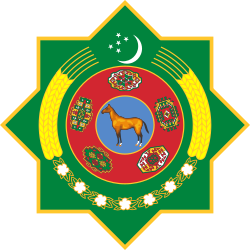| | ||||||||||||||||||||||||||||||||||||||||
| ||||||||||||||||||||||||||||||||||||||||
All 125 seats in the Assembly 63 seats needed for a majority | ||||||||||||||||||||||||||||||||||||||||
| Turnout | 91.33% | |||||||||||||||||||||||||||||||||||||||
|---|---|---|---|---|---|---|---|---|---|---|---|---|---|---|---|---|---|---|---|---|---|---|---|---|---|---|---|---|---|---|---|---|---|---|---|---|---|---|---|---|
This lists parties that won seats. See the complete results below.
| ||||||||||||||||||||||||||||||||||||||||
 |
|---|
Parliamentary elections were held in Turkmenistan on 15 December 2013. [1] [2] Although they were the first multi-party elections in the country's history, both contesting parties claimed loyalty to President Gurbanguly Berdimuhamedow. [3] The ruling Democratic Party emerged as the largest faction in the Assembly with 47 of the 125 seats, losing its parliamentary majority for the first time since independence. The elections were criticized by the OSCE, Amnesty International, and opposition groups such as the Turkmen Initiative for Human Rights. [4] Farid Tukhbatulin of the Turkmen Initiative for Human Rights said that there was little difference between the two major parties, arguing that neither truly represented opposition groups. [4]
